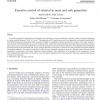Free Online Productivity Tools
i2Speak
i2Symbol
i2OCR
iTex2Img
iWeb2Print
iWeb2Shot
i2Type
iPdf2Split
iPdf2Merge
i2Bopomofo
i2Arabic
i2Style
i2Image
i2PDF
iLatex2Rtf
Sci2ools
131
click to vote
COGSR
2011
2011
Executive control of retrieval in noun and verb generation
In verb/noun generation experiments, participants have to produce a word associated with a stimulus (usually a noun) and belonging to a given syntactic category (“verb” or “noun”). The explanation of RT performance in the verb generation task is partial and debated, with different proposals emphasizing either associative strength or competition among task-relevant responses. This paper presents a novel account of RT performance in noun and verb generation, which relies on the functional interaction between associative retrieval and executive control and takes explicitly into account the interference from task-irrelevant responses. We hypothesize that fundamental control processes in this generation task are the strategic allocation of attention on retrieval cues and post-retrieval response checking and response inhibition. An analytic model based on this account accurately reproduced the major empirical trends observed in three populations (young adults, older adults, Parkins...
Related Content
| Added | 13 May 2011 |
| Updated | 13 May 2011 |
| Type | Journal |
| Year | 2011 |
| Where | COGSR |
| Authors | Fabio Del Missier, Cristiano Crescentini |
Comments (0)

